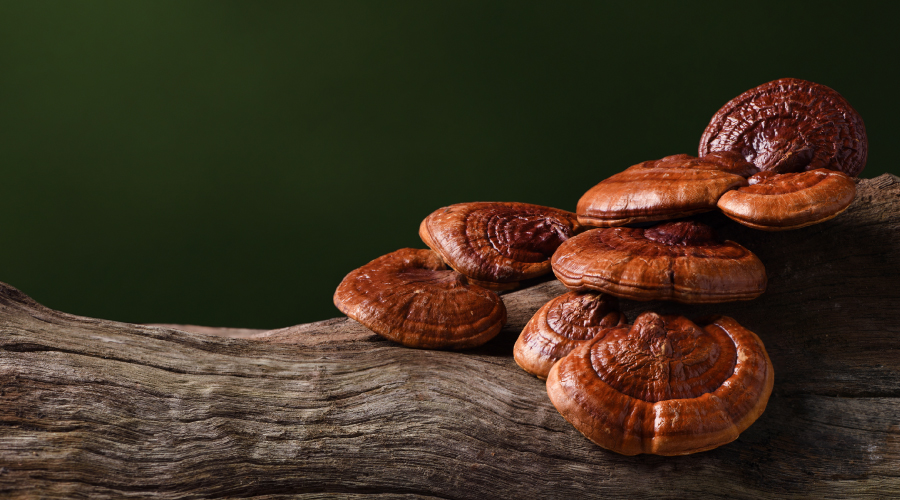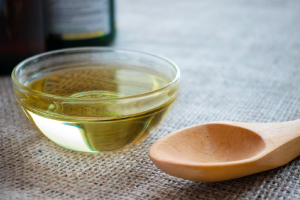

Reishi mushroom has a distinctive glossy, woody texture with a reddish-brown cap. The fungus grows in hot and humid locations in Asia. Unlike some fungal growths that can be poisonous, the reishi mushroom is safe and rather popular for its variety of potential health benefits. Read through to learn more about this magical medicinal mushroom.
About Reishi Mushroom
Reishi mushroom is a polypore fungus that grows up to 8 inches in diameter. They are found in the wild, growing on dead or decaying deciduous trees in the hot and humid parts of Asia. Red Reishi mushroom, the most beneficial form of reishi mushroom, has a reddish-brown, kidney-shaped cap. The mushroom has a glossy appearance but a bitter taste and tough texture. Thus, it is not directly used as a culinary ingredient. However, it is commonly added to tea or used in powder form for a range of health benefits.
Reishi Mushroom Benefits
For centuries, Asian cultures have hailed reishi mushroom for its supreme therapeutic benefits. In traditional Chinese medicine, reishi mushrooms are rated alongside Fu Zheng, a group of herbs that have the potential for overall vitality, well-being and longevity. The five key reishi mushroom benefits include:
1. Immune System Support
Reishi mushrooms are known to possess immunomodulatory properties, which help in regulating and strengthening the immune system. One of the key components responsible for this effect is the abundance of bioactive compounds called beta-glucans. These compounds work on both – the natural killer cells and T-cells. While an enhanced number of lymphocytes recognise and eliminate virus-infected cells and cancer cells, the increased number of T-cells helps in coordinating the immune response. By stimulating these immune cells, reishi mushrooms strengthen the body’s defence against infections and diseases.
2. Antioxidant Activity
Reishi mushroom is rich in antioxidants, including triterpenoids, polysaccharides and peptidoglycans. These compounds help neutralise the harmful free radicals in the body, which otherwise lead to oxidative stress and damage to cells. By reducing oxidative stress, Reishi mushrooms contribute to overall health and longevity. The increased antioxidant activity also counts as one of the best Reishi mushroom benefits for skin. This activity slows down the process of ageing, leading to significant improvement in skin quality and texture.
3. Reduces Stress and Fights Fatigue
The red Reishi mushroom is considered an adaptogen, meaning it can help the body adapt to stress, promoting a sense of calmness and relaxation. Studies show that the compounds in Reishi mushrooms act on the central nervous system. Reishi improves the neurotransmitters like serotonin and dopamine, which are involved in stress management. A study has found that women with fibromyalgia experienced improvement in mental health after taking reishi mushrooms. Moreover, it has tranquillising properties, which control anxiety. Thus, reishi extract is used in anti-anxiety therapy.
4. Anti-Cancer Properties
Reishi’s radical-scavenging and antioxidant properties protect you from cancer. A medical study found that it enhances the activity of natural killer cells, T lymphocytes and macrophages. Also, its antitumor properties suppress tumour invasiveness in cancer patients. Specifically, it has a good result on breast tumours, prostate cancer, myeloid leukaemia, and hepatoma.
5. Liver Health Support
Reishi mushrooms contain hepatoprotective elements like Ganoderma lucidum. Thus, it has the ability to promote liver health and protect it from damage. This element is combined with gastric ulcers and provides healing of around 40% to 60%. Moreover, the polysaccharides content of reishi boosts liver collagen and helps cure cirrhosis.
Other Potential Health Benefits
Apart from these five benefits of reishi mushroom, there are other health benefits. It has good effects on heart-related issues and diabetes. Let’s learn about these benefits:
1. Heart Health
It is a great cardiovascular treatment option, as it lowers blood pressure and cholesterol. It contains Peptides, which reduce blood pressure. Thus, reishi extract is used in antihypertensive medications and foods. Also, it has a convincing role in reducing bad (LDL) cholesterol.
2. Regulating Sugar Levels
Reishi is a powerful controller of blood sugar. It contains triterpenoids and polysaccharides. Thus, it decreases glucose and increases the level of insulin in patients with late-stage diabetes. Hence, it’s a helpful medicine used to manage blood sugar.
How to Use Reishi Mushrooms?
This mushroom can be absorbed in various forms, such as powders and extracts, or eaten as the entire mushroom.
- One can utilise the entire mushroom by adding it to tea. The dried pieces of mushroom should be boiled for 15 to 20 minutes. Then, add some lemon, honey, or spices to bring flavour to it.
- The liquid extracts of reishi can be added to plain water, milk, juices, and smoothies.
- Individuals can take reishi powder with milk, smoothies, snack bars, hot chocolate, or cakes.
Dosage Recommendations for Reishi Mushrooms
There is no such specific recommendation for taking reishi mushrooms. The quantity of mushrooms depends upon the health condition and status. It’s better to take advice from a physician before utilising it.
The supplementation guidelines are as follows:
- Powdered Form – If using a Reishi mushroom supplement in powdered form, then a common dosage range is between 1 and 2 gm per day. This dose can be divided into multiple sub-doses. The powder can be added to smoothies, soups or hot beverages.
- Capsules or Tablets – Ganoderma capsules benefits can be enjoyed in capsule or tablet form, typically in standardised extract form. The dosage will depend on the concentration of the extract. The typical daily dosage is 1 to 1.5 gm.
- Liquid Extracts or Tinctures – Liquid extracts or tinctures of reishi mushrooms usually come with a recommended dosage on the product label. Typically, 1 to 2 ml can be taken 1 to 3 times per day. The extract is diluted in water or juice before consumption.
Reishi Mushroom Side Effects
Reishi mushroom is an edible fungus and is generally considered safe for most people when consumed in appropriate amounts. However, incorrect usage or inappropriate doses may trigger side effects in some individuals. The potential side effects associated with reishi mushrooms include:
- Allergic reactions like skin rashes, itching, swelling or respiratory symptoms can surface in individuals allergic to reishi mushrooms. People with known allergies to mushrooms must avoid its use.
- Patients who are taking anti-diabetic drugs, immunosuppressants or blood thinners must consult a doctor before taking reishi. It has the potential to chemically interact with these drugs, which is not good news.
- The new users may experience temporary side effects from this mushroom. They might face diarrhoea, constipation, or digestive discomfort. Thus, they should take a lower amount of reishi at first and gradually increase it.
- Individuals with high blood pressure and pregnant or breastfeeding women should ask their doctor before incorporating the reishi supplement into their diet.
Conclusion
Ganoderma lucidum or reishi mushroom has numerous benefits. It improves the immune system as well as heart and liver health. At the same time, overconsumption or overlooking the potential side effects can put you in trouble. So, it is imperative to consult a doctor before introducing this mushroom to your life.




